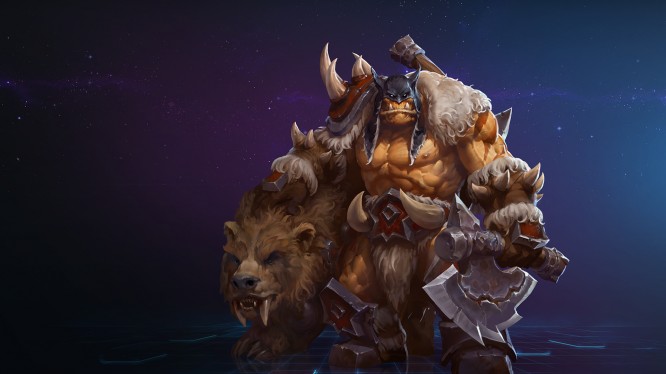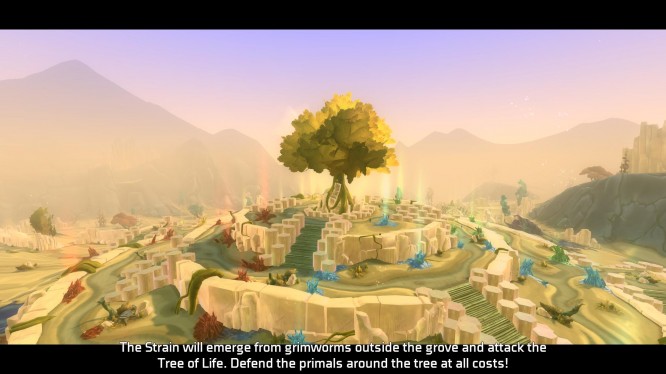

This is the second part of an ongoing look into the state of online gaming in Japan. If you’d like to read more on the subject head over to part one.
![]()
Last time, we discussed the issues facing the Japanese online gamer. Of note, Japanese online gaming is so niche that the term MMORPG has very little meaning to your average online gamer, who tends to be more of a console shooter fan than PC playboys/girls. According to Akiba MMO‘s CEO Keiko, “Japan essentially skipped the PC and jumped straight to mobile phones.” Having a big, bulky machine that’s primarily used at one’s place of work hardly seems like something that would have awesome games on it. Worse yet, because of the small market, few western companies translated their games into Japanese. No problem, right? Japanese people must be able to speak English like the rest of the world despite being an island nation no where near an English speaking country…
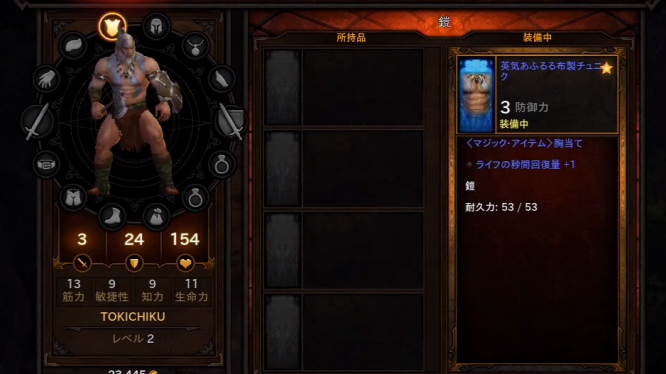
Despite having to learn it for at least six years, Japanese people really don’t speak English. As a teacher, this comes up a lot, but Keiko in particular noted that English’s role in Japan is often restricted to unique wording/phrasing that only makes sense to Japanese. In short, it’s used for adding an exotic flavor for advertisers, but as a communication language, people may only passively understand English. Even then, as founders of gaming, Japanese expect good games to be translated for them if they are indeed any good.
While there are certainly Japanese players who like western games, remember that online gaming is already a niche market. Add in the fact that foreign products are even more niche, so it’s more difficult to find translated fan sites of foreign games if you’re a Japanese player. There’s even a stigma that “Western games are shit” partially due to the fact that Japan simply didn’t have the PC gaming market to support localization into Japanese. While localization teams for Blizzard games may advertise in Japanese, the client is often still in English. This is most likely why Blizzard is practically unknown in this country. Everyone I spoke to who knows Blizzard’s games enjoyed them, but when asked why the games didn’t seem popular, the answer was always the same: no Japanese language support, until recently. Even then, keep in mind from last time that Japanese gamers tend to prefer anime style art. This is perhaps why Blizzard needed Square-Enix’s help releasing the game in Japan.
But let’s be fair. As Keiko put it, it you can’t understand the story, how to play the game, or the character/item system, it’s very hard to play the game. This is a universal issue, not a Japanese issue, and one reason why importing and raw media is uncommon at best for the general population. However, western PC players have greater access to these games for lower prices than console gamers. Europe and Asian countries with strong PC gaming communities allow us to invade their virtual worlds from time to time so we’re exposed to the idea of playing games in a foreign language more than the Japanese console gamers.
This isn’t to say that Japanese don’t play western games, and they certainly don’t avoid online ones. However, culturally speaking, Japanese people would prefer to stay silent and avoid inter-cultural communication issues. That may sound racist, but as someone who lives outside of the major Japanese cities, I can tell you life out here is quite different. It’s a stereo type, but all stereotypes are based on perspective. I’ve seen stupid Americans yelling when they just need to speak slowly, but I’ve never seen them begin to cry because a foreigner was trying to explain (in English) that their traveling companion doesn’t speak English.

Now, apply that to games, where you can no longer easily gesture, use facial expressions, draw pictures, or use the tone of your voice. Like in real life, Japanese players want to play games in their native language with other people that speak their language. However, in some ways, Japanese players online are perhaps a bit more clannish.
To be fair, Keiko feels that many Japanese players choose games they like and meet new people there. It’s not unheard of, and I even had a lone Japanese guy join my guild in Star Wars: The Old Republic. However, in my experience, many Japanese gamers in the MMO sphere, much like with Monster Hunter, people begin by joining their friends. Outside of Neverwinter Online, I was unable to find a Japanese guild in both the Japanese version of Darkfall and ArcheAge, even though I specifically went of out my way to search for them. Admittedly, these are PvP games, and foreign made ones at that. Often, people do tend to stick with people they’ve previously established ties with when joining these games. I did meet other lone wolf types, but when I asked if they would join a guild, many said they were waiting for a friend to join the game.
When I mentioned this issue to Matthieu, developer of Gangs of Space, and the Akihabara eSports Square staff, they had similar responses. Both feel that this is changing, but felt it is a bit of a problem. Part of it is the language. The eSports staff in particular noted that, for Japanese, it was difficult to talk to a person they don’t know outside of a game in English.
I can understand this, but also know this is compounded by the fact that, in my experience, not speaking and trying to play with native speakers is worse than admitting you’re not proficient in the language. There are countless times I’ve been grouped with non-native speakers, not just Japanese but Chinese, Korean, even German. Shy people exist in all cultures, but when these people didn’t speak up, they were verbally abused, and those are usually the words people understand. In MMOs, the first thing I do when there seems to be a problem is to check if the other person is a native English speaker. Most of the time, this is the problem, and since I’m an English teacher, if the group has a little patience, we can get through things well enough.
Few people play foreign games and possess zero knowledge of the foreign language/culture. Just the same, if a person doesn’t communicate their language handicap and is constantly abused, they won’t really bring their friends to the game. Although there were a few rude comments when I had previously mentioned my language issues when playing with Japanese players, the good ones stood out much more, and I honestly tend to be more of a negative person. Most people seem to stereotype Japanese as being overly polite, so you can only imagine what happens when foreigners who are usually accused of being rude taunt a Japanese player.
However, that can’t be the only factor. As Matthieu and the eSports Square staff commented, this may partially originate with Japan’s local co-op traditions. Although playing a game at someone’s house is limited to friends and family, Japanese people have been meeting in front of stores and at arcades for decades to physically play with or against people. The latter is especially relevant in terms of PvP play, in that the arcade scene (particularly fighting games and shooters) in Japan generally has you battling someone you can see and interact with before and after the fight. When taken online, where people can be anonymous and resort to trash talking, which I often saw between Japanese and Korean players on their shared Darkfall server, this tradition breaks down. It’s no wonder the Japanese players would prefer to stick with people they know!
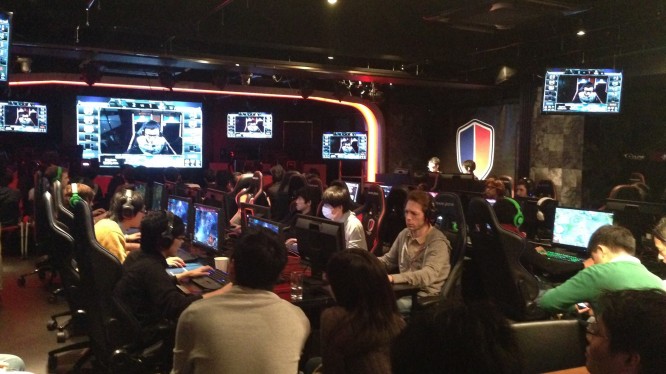
Although online gamers in the west are seen differently than non-online gamers, online gaming is so niche that most of my contacts have said there’s almost no difference. Matthieu says there is a small difference in the perception, with online gamers being seen more for being basement dwelling loners, but that image is going away. This is slightly confirmed by the eSports Square staff commenting on the fact that there being any difference at all only being recognized recently, but, in general, gamers are gamers in Japan, and as all my contacts– professional and casual alike– agree, gamers in Japan are still not highly respected. The overall negative image we hold of gamers in the states is still pretty true in Japan, but like the west, it is starting to soften, partially due to mobile gaming making games more acceptable by your average Japanese citizen.
Internationally, however, there are still issues the Japanese gamer must deal with. As I mentioned previously, Japanese gamers are often shy and may not even admit to being Japanese. People who played the original Final Fantasy 11 would also mention how the Japanese players sometimes seemed clannish, though I’ve also witnessed genuine random acts of kindness towards non-Japanese as well.
Within the eSports community, I’ve had people (Japanese and non-Japanese alike) personally tell me that Japan simply doesn’t care about international recognition, but that was up for debate. LoL players in particular seem to look forward to seeing what Japanese players are capable of, though many still don’t realize the Japanese players still don’t have their own servers (and Riot games has yet to return my inquiries about the situation). I know some of the eSports Square staff have personally voiced concern about Japanese players’ LoL skills in the competitive community, but the overall tone is that they just hope esports become more recognized in Japan.
Mathieu, on the other hand, noted that Japanese players often have different styles. A good example is the shooting scene. At least compared to the people in his non-Japanese gaming circle, the times the Japanese players he knows have joined them in matches, the Japanese are simply in a different league.
However, Keiko really brought up what may be the truest sentiment: if Japanese players don’t care about the international scene, it has more to do with their language ability than anything else. The hesitance to community in an international setting, in English, is quite challenging, especially when the games themselves are also often in English. If the tables were turned, and the games were in Japanese and had international players speaking in Japanese, they would be much more open to it.
The overall environment for online gaming in Japan is certainly a small and fairly close one. It’s alive and healthy enough, but as Matthieu put it, if you don’t know someone in it, you don’t really have access to it. However, even the most cynical people I spoke to do think online gaming has a future, even with competition from the mobile crowd. I feel that the rise of tablets is giving the PC market a solid middle ground and potential step for those who tire of mobile phone games and need something meatier. The availability of World of Tanks and its Japanese client certainly drew attention to the event Keiko helped with!

However, there needs to be support. Steam already provides Japanese language options at least for shopping, which is a good start. Riot’s Tokyo office will hopefully release news on a Japanese server, or at least language pack, for Japanese gamers. Kei’s MMO site, Akiba MMO, serves as a general community site, mostly for PC gamers and developers. It’s actually providing a space where presenting developers are posting about the games they’re bringing to Tokyo Indie Festival. The country is already home to many internet cafes to make-up for the fact that PC aren’t considered a necessity in Japan, but Akihabara eSports Square at least encourages patrons to download their Steam games when visiting their location.
It’s a good start, but I wonder if it’s enough. In the west, we had small time developers leading the charge in MMORPG development. Origin Systems and Turbine aren’t exactly household names, but few MMO players have trouble recognizing their work. Perhaps a game like Kantai Collection can help make way for online games’ popularity, but I don’t know if that’s enough, and indie developers are rare in Japan. There’s a big difference between making doushinji (games made for fun more than profit) and being an indie developer trying to make a living, and the latter are quite rare in Japan, though I was lucky enough to meet some.
My interview with Matthieu occurred at Pico Pico Cafe, which hosts something called “Picotachi,” a monthly indie game developer (and fan) meet. The place is absolutely packed to the point where I’d certainly call it a “standing-room only” type of event. There were some interesting games, but mostly they were simply, ranging from 2-D platformers to a 100-player Tetris that required 10 people to form a single line across their territories to clear the blocks. Fun stuff but nothing quite on the same level as an online game. In fact, after talking to Matthieu and looking at the list of TIF presenters (so far), it seems the Japanese indie devs are naturally chasing the most profitable market: mobile gaming. Aside from Gangs of Space, nothing seemed to indicate that the indie scene here is looking to bulk up the online gaming market.
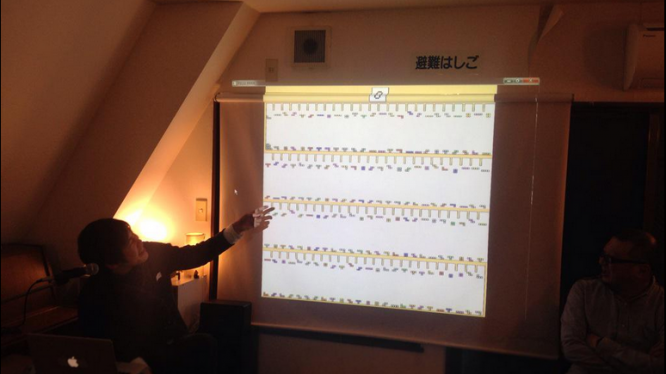
Photo Courtesy of Joseph White: https://twitter.com/lexaloffle
It feels like the big corporations, like Square and Sega, will be needed to develop the online gaming market. Smaller projects certainly seem to be helping. Before starting this project, most people I talked to seemed, like myself, fairly isolated in their physical locations about their online, PC gaming hobby. We mostly meet and talk to other people online, and if someone changes games or doesn’t log in at the right time, they seemingly disappear. Finally making some business contacts has shown me that there is a community here, but it’s certainly in a position to grow. There are opportunities for people willing to network and innovate, assuming you have the money understand the current culture. I feel that the last point is probably what’s kept western publishers out of Japan. Until they either invest the money or innovation to attract the audience, Japan’s online gaming community will probably remain very niche, limited mostly to shooter fans, monster hunters, and gamers who also are willing to put up a foreign language in their pursuit of finding a virtual paradise…. or Valhalla.
